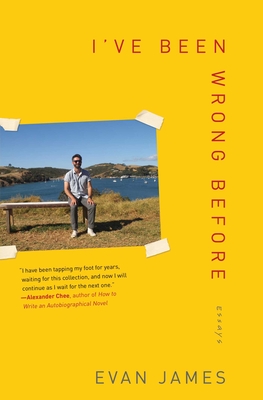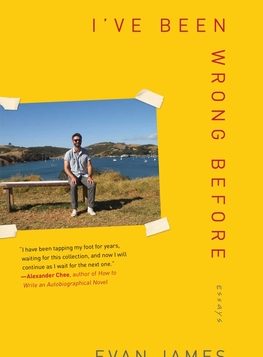 I’VE BEEN WRONG BEFORE
I’VE BEEN WRONG BEFORE
by Evan James
Atria Paperback. 243 pages, $17.
“MAY I CONFESS to you a few things about myself?” Evan James asks in one of the 23 essays that make up I’ve Been Wrong Before, an assessment of his young adulthood, globe-trotting adventures in his thirties, and daddy issues. Recounted are early attempts to establish himself as “an actual journalist” and find himself as a writer. What stands out most clearly is the heartbreaking difficulty of a writer’s life: a patchwork of low-paying jobs, sublet apartments, fantasies of whoring himself out to slick ad agencies, and road trips made in a secondhand car with no air conditioning and a broken radio, made bearable only by listening to books-on-tape from a secondhand boom box.
Writing, James explains in the opening piece, “Lover’s Theme,” is his attempt to construct a legacy, something he admits can never be more than “a trail of futile attempts as evidence that I lived—in places, among people, all of us through the storm of time.” This stylized self-effacement somehow evokes a picture of the earnest writer bent over his desk by candlelight, quill in hand, lost in his work as lightning flashes outside his window. But James is writing about living in San Francisco in 2007, performing in a drag show dressed as a cellphone. Somehow the pictures don’t match the captions. James often goes somewhere because of his interest in writing—to the Georgia childhood home of Carson McCullers for a residency, to the Philippines to visit a friend from graduate school—but he doesn’t tell us about the writing process itself. He talks instead about his everyday life, reconstructing unimportant conversations at length and relaying mundane details: “Then Mark found some aspirin for me in the kitchen—I had a sore throat—and I retired to the guest room,” he writes in “A Happy Week,” an account of visiting Provincetown during this “critical mass of body hair and happiness.” But neither Mark nor the sore throat has any special relevance. They’re just little facts, dangling like mismatched socks hung out to dry. Too often James gives dull accounts of fascinating subjects. His mother, for instance, is a psychic medium who believes she can communicate with ghosts. Rather than dig into how her beliefs comport with his own, James paints her as a cozy eccentric, wrapped in a blanket, holding a mug of tea. A different version of his mother comes to life in “One Hell of a Homie,” James’ account of coming out, when she tells him: “You’re in for a life of pain.” But he doesn’t try to integrate the different aspects of her character or wonder about their inconsistencies. Absent from the picture, but also painfully present, is his biological father, whom James barely knew. Could this be responsible for his attraction to older men? In “A Sailor’s Tale,” a 21-year old James learns to cook to impress his 37-year old lover in unconscious imitation of his father, “a splendid cook. Or so says my mother.” In “Like God,” a college-age James, studying abroad, relishes being mistaken for a prostitute when he’s picked up by a Colombian hairdresser who’s “probably in his thirties” with whom he quickly moves in, fantasizing about dropping out of school and supporting himself by working at a bathhouse. James finds himself at another bathhouse in Montreal in “Vanishing Days.” Drawn to these places, he doesn’t seem to know what to do once he’s inside. “What was I still doing there, foiled in my desire to escape from myself?” he writes, resisting men’s advances. This resistance feels like a stalling tactic, like so much of this book, a way to avoid getting to the meat of the discussion. It’s as if, in the bathhouses he sometimes frequents, he coyly lets the edge of his towel slip while starting a conversation about the weather. One wants to shout: take the damn thing off and show us who you are! ___________________________________________________________
Michael Quinn reviews books for Publishers Weekly, for literary journals, and for his website at mastermichaelquinn.com.





